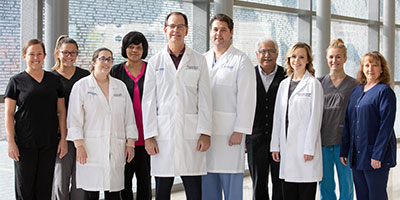Leaders in Clinical Excellence Awards
Program Development Award (2018)
This award celebrates the innovation and collaboration that are foundational to the success of UT Southwestern Medical Center. It recognizes a group of clinical faculty and staff who have partnered to create, develop, and sustain an innovative program that significantly advances our ability to improve the care received by our patients.
The 2018 Winners:
UT Southwestern Medical Center Lung Transplant Program
Fernando Torres, M.D.
Professor, Internal Medicine
Medical Director, Lung Transplantation
Head of the Pulmonary Hypertension Program
Michael Wait, M.D.
Professor, Cardiovascular and Thoracic Surgery
Chief of the Cardiovascular and Thoracic Surgery Service at William P. Clements Jr. University Hospital and Parkland Hospital
Led by Dr. Torres and Dr. Wait, the UT Southwestern Medical Center Lung Transplant Program provides lifesaving transplants for patients with end-stage lung diseases for which there is no cure. The program is a collaborative effort requiring extensive communication and teamwork from the Department of Internal Medicine, the Department of Cardiovascular and Thoracic Surgery, and numerous other areas across the UT Southwestern Health System.
Among its recent achievements, the program brought Ex-vivo lung perfusion technology to UTSW, allowing deceased donor lungs to be evaluated in a perfusion chamber prior to transplant and extending the number of available organs.
Additionally, the service has developed a dedicated extracorporeal membrane oxygenation (ECMO) team that permits bridging of critically ill patients for weeks until donor lungs can be identified. The UTSW Lung Transplant team has performed more than 760 lifesaving transplants –one of fewer than 25 programs in the U.S. to reach this milestone. Program patients’ one-year survival rate is No. 1 in the region and exceeds the national average.
In their words: "On behalf of the entire Lung Transplant Program, we are humbly honored to be awarded recognition for the campuswide Leaders in Clinical Excellence Award. This has been a collegial group effort that dates back to 1990, when Dr. Steves Ring performed the first (single left) lung transplant here at UT Southwestern. Our goal is to continue to provide advances in clinical research, education, and patient care to broaden the horizons of transplant opportunity and improve our treatment of chronic rejection."

Parkland Memorial Hospital Perinatal Intervention Program
Kurt Kleinschmidt, M.D.
Professor
Emergency Medicine – Toxicology
Division Chief for Medical Toxicology
Parkland Memorial Hospital’s Perinatal Intervention Program, led by Dr. Kleinschmidt, optimizes the care of pregnant women who have substance use disorders (SUD) through education and the development of a multidisciplinary process. While conceived more than 20 years ago, the program’s overall care has grown in recent years. It is available to any pregnant woman in Dallas County with an SUD.
The program has a multidisciplinary management team of addiction and maternal-fetal medicine (MFM) physicians, advanced practice providers, drug counselors, addiction-focused social workers, and child life specialists.
Complete prenatal care is offered by MFM doctors and staff, while group and individual counseling, child life classes, and psychotherapy are also available. Pregnancy options include a slow inpatient taper from opioids, followed by maintenance therapy after delivery, or immediate maintenance therapy. Patient care extends beyond discharge with connections to community programs that provide care both during and after pregnancy, including safe housing for some patients.
The program is one of the few in the country to provide women with SUD with such comprehensive care.
In his words: “It is exciting to have such a large group of people come together to optimize the care of this very stigmatized population – mothers with addictions. Our mothers are good people who have the terrible disease of addiction, but who want to be good mothers. Addiction is a disease that requires care like any other chronic disease. We are blessed to have an outstanding team ready to provide that care.”

Parkland Memorial Hospital Self-Administered Outpatient Parenteral Antibiotic Therapy Program
Kavita Bhavan, M.D.
Associate Professor
Internal Medicine – Infectious Diseases and Geographic Medicine
Led by Dr. Bhavan, the Parkland Memorial Hospital Self-Administered Outpatient Parenteral Antibiotic Therapy (S-OPAT) Program was designed to allow uninsured patients who cannot access traditional outpatient intravenous antibiotic delivery services the ability to complete treatment for complex infections in the comfort of their own homes. This new care delivery model helps both patients and providers avoid the expense, potential complications, and inconvenience of hospitalization.
With more than 3,000 patients treated since opening in 2009, this multidisciplinary program has leveraged expertise from nurses, pharmacists, and care management to effectively “teach and train” patients infusion by gravity and when appropriate, the IV push method for specific antibiotics. Patients are taught at the bedside and tested for competency to ensure safe transition of care from hospital to home.
Through effective patient engagement, the program has demonstrated successful clinical outcomes, showing a 47 percent reduction in 30-day readmission for patients followed in S-OPAT compared to patients receiving health care-administered OPAT. During this time period, more than 27,000 hospital bed days were avoided – resulting in approximately $40 million dollars of cost savings. High levels of patient satisfaction have been reported and the program continues to demonstrate high-value care and growth through innovation.
S-OPAT uses technology such as QR codes stamped on IV fluid bags that patients can scan – linking them to a YouTube video demonstrating proper administration technique. These educational techniques have been useful for visual learning and for patients who speak languages other than English and Spanish.
Dr. Bhavan was awarded with the 2016 Gage award from America’s Essential Hospitals and the 2017 Clinical Practice Innovation Award from the Infectious Diseases Society of America and continues to share information on the principles of the S-OPAT program and how it can be used in other underserved areas.
In her words: “Our team is honored to be recognized by the leadership of UT Southwestern. Continuous improvement and innovation for better care are not only part of the UTSW mission, but a driving force in the evolution of our clinic, which has reduced existing health disparities for an underserved population in the process. While we developed an innovative approach toward self-care, the patients have demonstrated the greater impact of tapping into human potential with effective engagement, to do something that many didn’t think they could do. I think the S-OPAT team would agree our patients are the true heroes here. We just gave them the opportunity to shine.”

